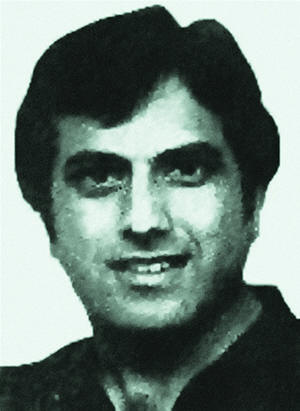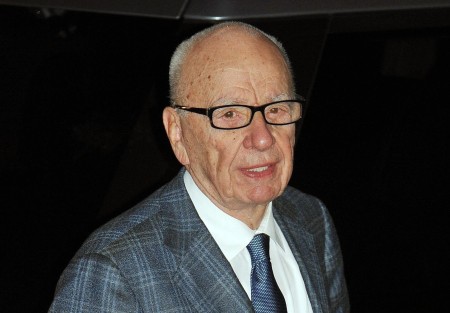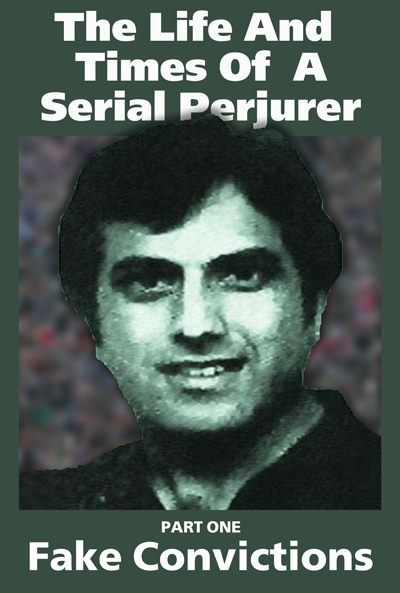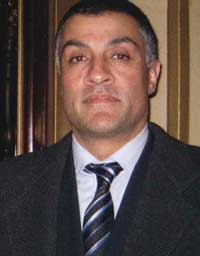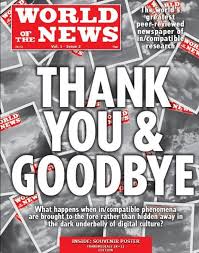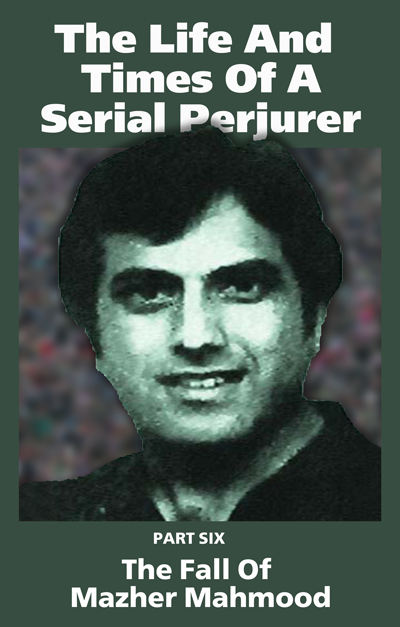
TODAY A jury found Mazher Mahmood guilty of conspiracy to pervert the course of justice.
The verdict was unanimous.
The 53-year-old Mahmood and his former driver Alan Smith, 66, were convicted of plotting to doctor a statement in the Tulisa Contostavlos drugs trial in 2014.
[The two men were sentenced on October 21.
Mahmood was gaoled for 15 months — Smith received a 12 months suspended sentence.]
The verdict destroys Mazher Mahmood’s reputation.
Mahmood did not dare to give evidence because of the substantial body of evidence the prosecution would have marshalled against him.
Some of this comes from Press Gang:
— Mahmood lied to the Leveson Inquiry about the number of criminal convictions he as responsible for.
He claimed more than 250 but Press Gang could only find 70.
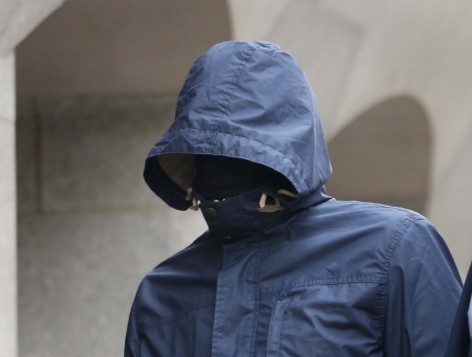
FALSEHOOD
MAZHER MAHMOOD arrives at the Old Bailey still determined to preserve his anonymity. The jury were told that there were 11 emails between Mahmood and his driver Alan Smith. When police inspected their computers they found they’d all been deleted …
Photo: PA
Our investigation forced him to go back to Leveson and admit that Murdoch lawyers had come up with just 94.
— in 2012 Press Gang warned Murdoch’s ethics watchdog (the Management and Standards Committee) that Mahmood was a serial perjurer.
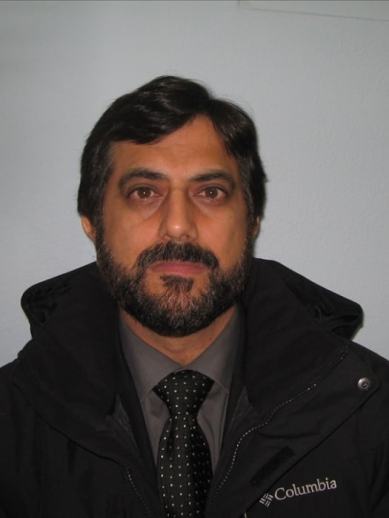
SNAPPED
THE PICTURE taken by police after Mahmood was convicted …
Over and over again, he’d gone into the dock and lied about his success in securing convictions.
These inflated claims made it more and more difficult for his victims to defend themselves.
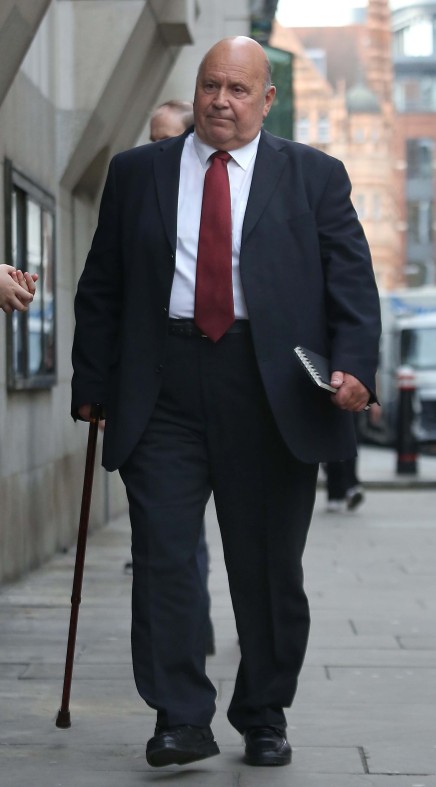
- ALAN SMITH
THERE WERE four phone calls between Smith and Mahmood at this time. Police wanted to examine Smith’s mobile phone but he told them it had been destroyed either after it was run over by a motor car or after a jacked-up vehicle had been dropped on it. He was given a suspended 12 months prison sentence.
Photo: PA
The Management and Standards Committee didn’t reply.
— Press Gang revealed that two years before the Tulisa exposé, Mahmood used an associate to prostitute herself to persuade a dentist to agree to carry out female genital mutilation.
This was for a front page exposé for the Sunday Times in 2012.
The case against the dentist collapsed when the journalist / prostitute refused to sign a statement.
(The story is told in Withering Heights.)
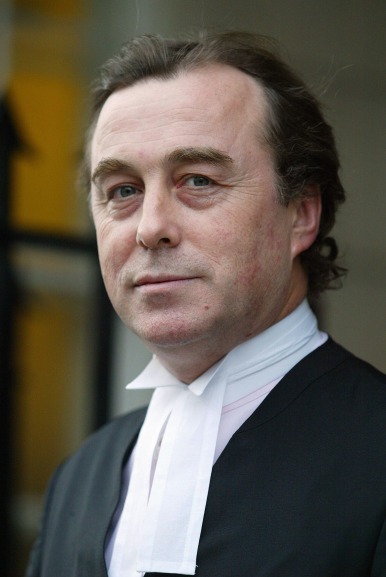
- “FUNDAMENTALLY FLAWED”
DEFENCE BARRISTER John Kelsey-Fry QC said the case against Mahmood was “fundamentally flawed and illogical and defies common sense.” His client “repeatedly insists he did not discuss Smith’s evidence with him and he repeatedly insists he could not discuss Smith’s evidence.”
Photo: PA
The most detailed account of how Tulisa turned the tables on Mahmood is the following Press Gang article published in August 2014.
It’s a shocking story …
♦♦♦
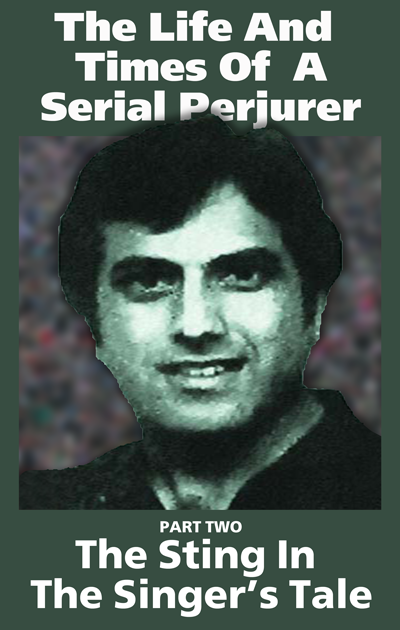
Originally published:
29 August 2014
♦♦♦
THE FULL story behind the dramatic collapse of the trial of singer Tulisa Contostavlos — and the unscrupulous role of Sun on Sunday reporter Mazher Mahmood — has not been told.
During the trial in July [2014] it became clear that one of Mahmood’s associates, a driver called Alan Smith, changed his witness statement after a discussion with the reporter.
Mahmood had claimed, at an earlier hearing, that he hadn’t spoken to him.
Press Gang can now reveal that Smith has a criminal record.
And it’s not the first time he’s played a devious role in one of the undercover reporter’s stories.
The judge in the Tulisa Contostavlos case concluded Mahmood deliberately lied to the court.
The case was dismissed.
Mahmood has now been suspended by The Sun and the Metropolitan Police are investigating the allegation that he committed perjury.
But the extraordinary sequence of events which led to the singer walking free has not been revealed — even though reporters were well aware of it.
The case also calls into question the willingness of Scotland Yard to base criminal cases on the work of a journalist with a long history of perjury allegations.
Long before Tulisa Contostavlos was charged, the editor of this website wrote to the Metropolitan Police asking them to investigate Mahmood for perjury.
We pointed out that Mahmood had not only lied to the Leveson Inquiry about the number of convictions he’d secured but may also have lied about the issue in several of the criminal prosecutions he generated.
The Met did not reply.
This article tells the inside story of how one of Rupert Murdoch’s favourite reporters fell from grace …
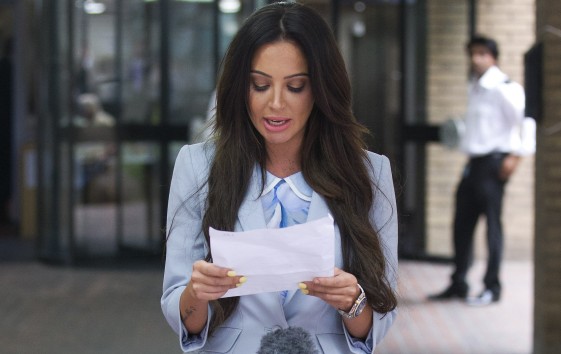
- TULISA CONTOSTAVLOS
THE SINGER walked free after Sun on Sunday undercover reporter Mazher Mahmood was caught lying in the witness-box …
Photo: PA
♦♦♦
ON MAY 10 last year a gang practiced in the arts of entrapment prepared for another session with one of their victims.
The group had rented a suite at the 5 star Metropolitan Hotel just off Park Lane in the centre of London.
The target was the singer Tulisa Contostavlos.
She’d enjoyed a successful career with the hip hop band N’Dubz and had been a judge in the TV series The X Factor for two years running.
The man after her scalp was Mazher Mahmood.
In a controversial career spanning more than three decades, Mahmood had chalked up a reputation as one of the most dangerous adversaries in Fleet Street.
As the “Fake Sheik” he’d humiliated the rich and the powerful — including Prince Edward’s wife, the former Sophie Rhys-Jones, and the Duchess of Kent.
But he’d also seen famous celebrities and sportsmen gaoled after his elaborate stings.
This time it was to be a battle between the experienced Mahmood and a young woman from a broken family in North London.
The odds were stacked against the singer.
Tulisa Contostavlos was just 25.
At 50, Mahmood was twice her age.
She was the only child of musician parents who broke up when she was young.
She lived with her mother who had a long history of mental health problems.
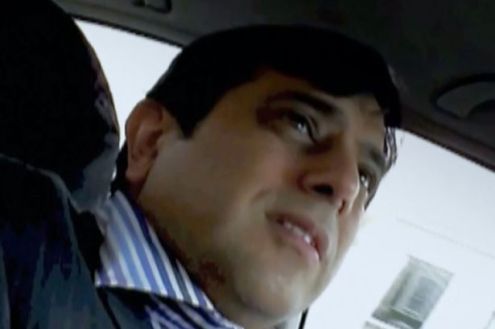
- STRAIGHT STALKING
MAZHER MAHMOOD targeted the singer because she held out the promise of a “gold standard” sting — a huge story with criminal convictions at the end of it. Tulisa was young, beautiful and had taken her career in a successful hip hop band to a new level when she became an X Factor judge. But Mahmood also thought she was likely to be a cocaine user — one of the million or so British people who regularly use the drug with a heavy concentration in the entertainment business. By early 2013 she’d made it plain she wanted a career in Hollywood — and was therefore ripe for a classic Mahmood sting … In her autobiography Honest (2012) she revealed she’d self-harmed as a teenager.
Photo: BBC
She joined the hip hop band N’Dubz — named after the London district NW1 where she grew up — when she was 12.
The band had its first chart success in May 2007.
In November of that year — when she was 18 — she appeared in the Channel 4 programme Dubplate Drama.
She played a cocaine addict.
In 2011 and 2012 she was one of the judges on Simon Cowell’s The X Factor series.
In May 2012 her solo single “Young” went to No 1.
But a few months earlier her ex-boyfriend Justin Edwards posted online a sex video of the couple.
She took him to court and won damages against him.
By early 2013, she was disillusioned with the music business in Britain.
“I wanted to get out. I wanted to go into acting and piss off to America,” she said later.
She went to Los Angeles to audition for parts.
That’s where Mazher Mahmood and his gang targeted her.
He created a sting based on her public comment that she was a big fan of the actor Leonardo DiCaprio..
He pretended to be a Bollywood producer called Samir Khan and offered her a £3.5 million role in a movie starring alongside DiCaprio.
He flew her to Las Vegas in March 2013 and gave her and her entourage two suites at one of the city’s top hotels, the Venetian.
During her stay, she was given bodyguards and the best tables at nightclubs.
By the time the Las Vegas trip was over, she was convinced she was in line for a major movie that would transform her life.
“I was like a lost puppy,” she later recalled, “because I wanted it so badly to be true.”
♦♦♦
WHEN TULISA and her team arrived at the Metropolitan on May 10, Mahmood and his gang were ready.
The reporter and his entourage were armed with hidden cameras and microphones.
But the singer proved a tough nut to crack.
Throughout the long, six-hour session — and the constant flow of alcohol — she kept a cool head.
She clearly didn’t take drugs.
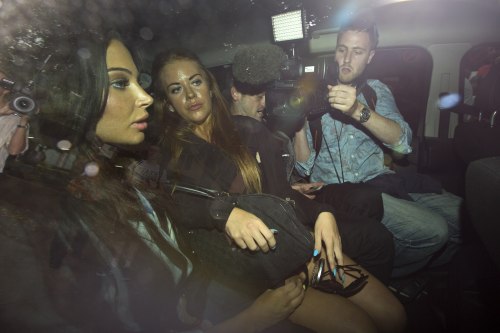
- TABLES TURNED
ON THE journey home from a six-hour session where she was plied with drink by Mazher Mahmood’s gang, the singer made it clear she disapproved of drugs. It was a statement that was to save her from a criminal conviction — and dramatically turn the tables on her accuser. Mahmood is now being investigated for perjury … a far more serious offence than the one she was charged with.
Photo: PA
She was also discreet.
She was careful not to badmouth the famous people she knew — like Simon Cowell, the man behind X Factor.
Mahmood had brought up the subject of “celebrity prostitution”.
When it was suggested that she go to Mahmood’s bedroom, she refused.
She was going to land the part on the basis of her acting ability alone.
But Mahmood had a trick up his sleeve.
He didn’t believe in formal auditions, he said.
He preferred “social auditioning” and urged her to demonstrate that she could play the character of a young London druggie in order to get the part.
She played the part, pretending to be a member of a drug gang in her past.
Mahmood said he was coming back to London later that month and planning a night out for his friends at a strip club.
Could she help set up the evening?
Still in character, she said it would be no problem.
At the end of the evening, Mahmood’s driver took the singer and her team home.
The driver was a long-standing associate of Mahmood’s called Alan Smith.
During the journey Tulisa and her associates talked about the evening.
The singer said that a member of her family had a drug problem — and that she personally disapproved of them.
At this point she was revealing her real views on drugs …
♦♦♦
ON MAY 21 Tulisa spoke to Mazher Mahmood on the phone about the proposed evening at the night club.
He challenged her to prove her street credentials by giving him the name of a cocaine dealer.
She didn’t know any — but thought that her rapper friend Michael Coombs might pretend to be one.
He’d acted alongside her in the Channel 4 programme “Dubplate Drama” back in 2007 — Coombs had played the dealer to her character.
She thought he’d be able to string the producer along.
On May 22 Mahmood rang Coombs who agreed to supply cocaine.
At a meeting at the Dorchester in the early hours of the next day, Coombs sold the reporter just under half an ounce — 13.9 grams — of cocaine for £820.
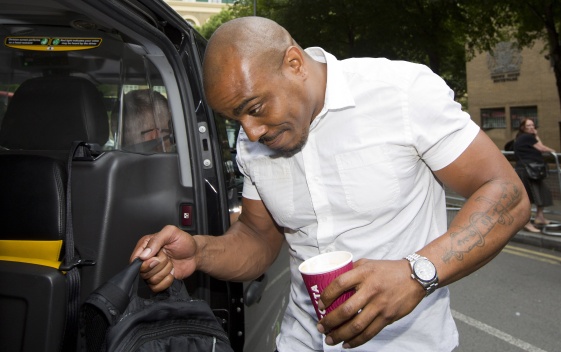
- MICHAEL COOMBS
The 36-year-old rapper friend of Tulisa C, known as Mike GLC, pleaded guilty to selling Mazher Mahmood 13.9 grams of cocaine for £820. The case against him was also dropped when the judge realised that Mahmood had lied under oath.
Photo: PA
The exchange was filmed.
On June 2 [2013] the Sun on Sunday “World Exclusive” front page proclaimed “Tulisa’s Cocaine Deal Shame”.
She was arrested two days later.
By the time the trial began on July 14 this year, the omens were not good for the singer.
Mike Coombs pleaded guilty to supplying the drug — and was likely to face a prison sentence.
The singer pleaded not guilty to being involved in the supply of cocaine.
Her defence team had earlier failed to have the case struck out.
Her barrister said that the offer of a £3.5 million role in a film alongside DiCaprio was an “exceptional inducement”.
He also argued that the evidence Mahmood supplied was invalid because it broke the Police and Criminal Evidence Act — it was tainted by the amounts of alcohol the singer had consumed.
Judge Alistair McCreath rejected both applications.
He also refused to allow the defence to introduce details of other criminal cases involving Mahmood which had collapsed.
And he would not allow the defence to bring evidence of Mahmood’s bad character.
The defence team were still confident that they had a strong defence.
But Tulisa later said she was 100 per cent certain she was going to be convicted:
“I was preparing for prison.”
♦♦♦
BUT A miracle was about to happen.
When Mahmood handed over the sting material to the police, there was nothing from the driver Alan Smith.
The defence had a hunch that his vehicle had been bugged on the night he took her home from the Metropolitan.
A few weeks before the trial, the defence insisted police take a statement from him.
On June 23 a detective constable rang Smith and took notes of the conversation.
Smith told the detective that the subject of drugs came up and Tulisa had been very negative about them.
The detective prepared a statement and rang Smith to check it.
He made sure that the driver understood his obligations as a potential witness.
Smith said he was happy with the statement and would sign it.
The detective emailed the statement.
The next day, Smith rang the detective.
He said he was no longer sure it was the singer who had made the comment — it might have been another woman in the car.
The statement was changed and Smith signed it.
The next day, June 25, both statements were provided to the defence.
Here, they thought, was a ray of hope.
Smith’s initial statement gave credibility to the singer’s story that she was only playing a part when she was talking to Mahmood.
On June 27 — three days after Smith signed his changed statement — Mazher Mahmood was giving evidence under oath at a pre-trial hearing.
He was questioned by Tulisa’s barrister Jeremy Dein, QC about Alan Smith’s comment.
First, he was asked if the conversation between Alan Smith and the singer had been recorded.
“No”, answered Mahmood.
“But did you subsequently ask or find out, discuss with Mr Smith anything that was said in the car?
The answer was again “No”.
“Because I just want to see whether you were aware of this.”
“Mr Smith made a statement to the police saying that in the car Ms Contostavlos was talking about drugs and saying that a member of her family had a drug problem and she disapproved of drugs.”
“All I want to know from you is whether you discussed that with Mr Smith at any stage?”
The answer from Mahmood was clear and emphatic:
“No.”
Mahmood’s answers intrigued the defence team.
Lawyers from Hickman Rose, who represented the singer, began to make inquiries about Alan Smith.
They quickly discovered he’d been a long-term member of Mahmood’s team.
And he had a criminal record.
He’s also been involved in some of the reporter’s stories.
In May 1997, while he was Investigations Editor at the News of the World, Mahmood published an exposé of a centre in Hayes where the courts sent prisoners to do community service.
One of the people he exposed was an unemployed chauffeur called Alan Graham who was photographed sleeping in the back of a Rolls Royce Silver Spirit.
The caption read “Snooze a Naughty Boy?”
What Mahmood did not tell News of the World readers was that Graham was actually one of his drivers, Alan Smith.
Mahmood calls him “Smithy” and describes him as a “bald-headed burly” and said he was a “wide boy”.
The Rolls Royce had been hired by the paper.
Smith had been sentenced to 100 hours community service by Uxbridge magistrates for fraud.
Mahmood later said that Smith had been included in the article under an alias to disguise the fact that he was the informant for the story …
♦♦♦
THE WEEK before the trial opened, the defence asked the Crown Prosecution Service to bring Alan Smith to the court as a potential witness.
On July 16, the third day of the trial, Smith was interviewed by defence solicitors in the presence of a Metropolitan Police detective.
This took place while Mahmood was on the stand, giving evidence for the prosecution.

- BEN ROSE
THE LAWYER headed the legal team representing Tulisa Contostavlos. Solicitors suspected there was something fishy about the evidence given by Mazher Mahmood’s driver.
Photo: Hickman Rose
Smith confirmed that the original version of his statement stated that the subject of drugs had come up.
The singer had been very negative about them.
But he’d become unhappy about the statement.
He told the defence he’d sent a copy of the initial statement to Mahmood and then spoke to him about what he should do.
He said that Mahmood told him that, if he was unhappy with his statement, he should ring the police and change it.
The defence team were stunned.
Mahmood had said, on oath on June 27, that he hadn’t discussed anything with Smith.
Now the driver was saying the exact opposite.
One of the two men was lying…
♦♦♦
THE NEXT day, Thursday, was the fourth day of the trial.
It was to be a day of high drama.
Mazher Mahmood was back in the witness-box to be cross-examined by defence QC Jeremy Dein.
Overnight, Mahmood had learned what Smith had told the defence — and realised he now faced a serious dilemma.
Once again, Dein asked him if he’d discussed with Smith what was said in the car.
Mahmood now changed his story.
He admitted he had talked to the driver two weeks earlier.
He said that Smith had rung him and said he wasn’t happy with his statement.
Mahmood told the court Smith had emailed the statement and the two men then had a conversation about it.
Mahmood told him that he should ring the police and change it if he was not sure Tulisa had made the remark.
Dein put it to Mahmood that he had lied when he gave evidence at the earlier hearing.
“I disagree with you,” was Mahmood’s answer.
The barrister put it to him that it was he, Mahmood, who had persuaded Smith to change his statement.
“I did not,” replied Mahmood.
Mahmood added that the change made no difference.
Smith, he said, was sensitive about drugs because his son had recently died of a drugs overdose.
After Mahmood left the box, Judge Alistair McCreath sent the jury out.
He then addressed both the prosecution and the defence.
He made it clear that he felt Mahmood had told a “knowing lie” when he gave evidence on June 27.
And that he did so, in his opinion, to conceal “improper conduct”: he had interfered with evidence that would have been to Tulisa’s advantage.
In circumstances where a key witness was guilty of “gross misconduct”, he added, it would be an abuse for the state to rely on him.
It would also compromise judicial integrity — “it would be on the court’s conscience,” he said.
He then adjourned the court.
Throughout these proceedings, the press gallery was packed.
Reporters cannot report what’s said when the jury is out but the judge’s comments would have made it clear that Mahmood’s earlier dramatic climb-down was not only sensational — it now threatened the entire case.
Yet not a word of what had happened was reported by that evening’s radio and television news.
The next morning, the press were also silent.
The Daily Mail, for example, led with the story that one of Tulisa’s aides told Mahmood that he believed Simon Cowell was gay.
The defence team were disappointed.
They’d hoped press reports of the sensational developments might generate other material helpful to their case.
♦♦♦
FRIDAY WAS the fifth day of the trial.
By now it was clear that the judge was proposing to reopen the abuse application he had turned down the previous month.
The prosecution, though, were unable to get advice from the Crown Prosecution Service (CPS) about contesting it.
So the matter was left to the following Monday.
By then, the CPS had thrown in the towel and made no objection to the judge re-opening the defence application to stop the proceedings.
Judge McCreath not only halted the trial — he also dismissed the case against Michael Coombs, who had already pleaded guilty to supplying the cocaine.
He said that if he had thrown out the case earlier, Coombs would not have had to stand trial.
In his judgment, McCreath was scathing about Mahmood’s evidence about Alan Smith’s statements:
“When he gave evidence last week, he was asked questions on the same topic and gave answers which were entirely inconsistent with his earlier evidence.”
“And it certainly appears that the contact he had with Mr Smith was not unconnected with a fundamental change in the evidence which it was anticipated Mr Smith was going to give.”
“He was, as you will have understood, expected to be able to give evidence supportive of Ms Contostavlos — that she told him she disapproves of hard drugs.”

- RUPERT MURDOCH
WHY DOES one of the world’s most powerful men continue to support the discredited Mahmood — a man accused by a judge of lying in the witness-box?
Photo: PA
“But after his conversation with Mr Mahmood, he had changed his mind.”
“It should not be forgotten that Mr Mahmood is
– the sole progenitor of this case
– the sole investigator
– the sole prosecution witness
– a man who has exercised his journalistic privilege to create a situation where the identities of others involved in the investigation are unknown to the defence (or the prosecution or even to me)
– someone who appears to have gone to considerable lengths to get Ms Contostavlos to agree to involve herself in criminal conduct, certainly to far greater lengths that would have been regarded as appropriate had he been a police investigator.”
He concluded:
“there are strong grounds for believing that Mr Mahmood told me lies when he gave evidence to me on June 27”.
And he added:
“there are also strong grounds for believing that the underlying purpose of these lies was to conceal the fact that he had been manipulating the evidence in this case by getting Mr Smith to change his account.”
He ended by saying, ominously for Mahmood:
“My view of the evidence cannot bind any other court which may (or may not) be called on to consider this matter in a different context.”
The fall-out from the collapse of the case was instant.
The Sun suspended Mahmood until an “immediate internal investigation” was complete.
The paper issued a statement:
“We are very disappointed with this outcome, but do believe the original investigation was conducted within the bounds of the law and the industry’s code.”
But it added:
“The Sun, of course, takes the judge’s remarks very seriously.”
A spokesman for The Sun told us this week Mahmood remains suspended and that “the internal investigation is ongoing.”
“I will not divulge further details of an internal investigation.”
He added that Alan Smith “worked on an ad-hoc basis with Mr Mahmood.”
The Met said:
” … the Metropolitan Police Service have been able to consider the judgment issued by the trial Judge along with other material supplied by the Prosecution Counsel …”.
“As a consequence of the information supplied officers from Specialist Crime and Operations are now investigating whether any of the matters highlighted amount to the commission of any criminal offences.”
The CPS said it “has no investigative powers and therefore any criminal investigations following the conclusion of this case are a matter for the Metropolitan Police Service.”
On September 30 lawyers for Tulisa Contostavlos will be in court for a hearing to determine if the Sun on Sunday should pay her legal costs.
They have still not decided if she will sue the newspaper.
♦♦♦
THE COLLAPSE of the trial raises many questions.
There’s no doubt the Metropolitan Police had no choice but to investigate when presented with clear evidence that Michael Coombs had sold drugs to Mahmood.
But the force was well aware that Mahmood, throughout his career, has come in for sustained criticism about his methods, some of it from judges.
They should have subjected his evidence to a forensic investigation of their own.
It should have been the force that interviewed Alan Smith and not have left it to the defence to force them to do it.
If Smith had not been interviewed, it’s possible Tulisa Contostavlos would now have a criminal record.
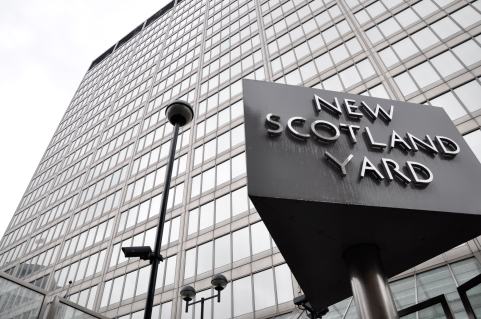
- NEW SCOTLAND YARD
IN 2012 Press Gang editor Paddy French wrote and asked the force to investigate allegations that Mazher Mahmood may have committed perjury in many of the cases where he gave evidence. There was no reply.
Photo: Rebecca
The force can’t say it wasn’t warned about the possibility of Mahmood committing perjury.
In November 2012 the editor of this website, Paddy French, wrote to Sue Akers, the Met’s deputy assistant commissioner, asking her to investigate allegations that Mahmood was a serial perjurer.
The letter cited the claim he made to the Leveson Inquiry, under oath, that he had more than 250 criminal convictions to his credit while he was Investigations Editor at the News of the World.
This was untrue.
Paddy French and researcher Chris Nichols had examined the News of the World throughout Mahmood’s career — and could find reports of only 70 convictions.
The full story is contained in the article Fake Convictions.
In the wake of this investigation, the Leveson Inquiry put the allegation to Mahmood.
What was then called News International called in the lawfirm Linklaters to carry out a proper audit.
In a subsequent statement to Leveson, Mahmood admitted that Linklaters could only find 94.
The letter also drew attention to the case against the London’s Burning actor John Alford who was gaoled in 1999 for supplying cocaine to Mahmood.
“In the September 2000 judgment refusing the actor known as John Alford leave to appeal against a nine month sentence for supplying cocaine to Mazher Mahmood’s undercover team in 1999, the court noted that Mahmood claimed 89 SCPs [successful criminal prosecutions]”.
At that point, Press Gang had found only 28.
The letter concluded by asking the Met “to examine Mr Mahmood’s testimony in all the court cases he gave evidence in to see if he has potentially committed perjury …”
A press officer told us Akers had retired and “the letter has been forwarded to deputy assistant commissioner Steve Kavanagh for consideration.”
“You will be contacted in due course.”
Kavanagh never replied.
♦♦♦
Published: 4 October 2016
© Press Gang
♦♦♦
NOTES
1
This the sixth article in the Press Gang series “The Life & Times Of A Serial Perjurer”. The previous articles and their links are:
http://wp.me/p3kXx7-3
The relevant statements about Mazher Mahmood’s claims about the convictions he secured to the Leveson Inquiry were made by Rebecca Television:
http://www.levesoninquiry.org.uk/wp-content/uploads/2012/07/Witness-statement-of-Paddy-French-including-exhibits.pdf
SECOND STATEMENT
http://www.levesoninquiry.org.uk/wp-content/uploads/2012/10/Second-witness-statement-of-Paddy-French2.pdf
FIRST WITNESS STATEMENT – MAZHER MAHMOOD
http://www.levesoninquiry.org.uk/wp-content/uploads/2012/08/Fourth-ws-of-Mazher-Mahmood.pdf
DONATIONS If you would like to support the work of Press Gang, you can do so by clicking the Donate button.
CORRECTIONS Please let us know if there are any mistakes in this article — they’ll be corrected as soon as possible.
RIGHT OF REPLY If you have been mentioned in this article and disagree with it, please let us have your comments. Provided your response is not defamatory we’ll add it to the article.








